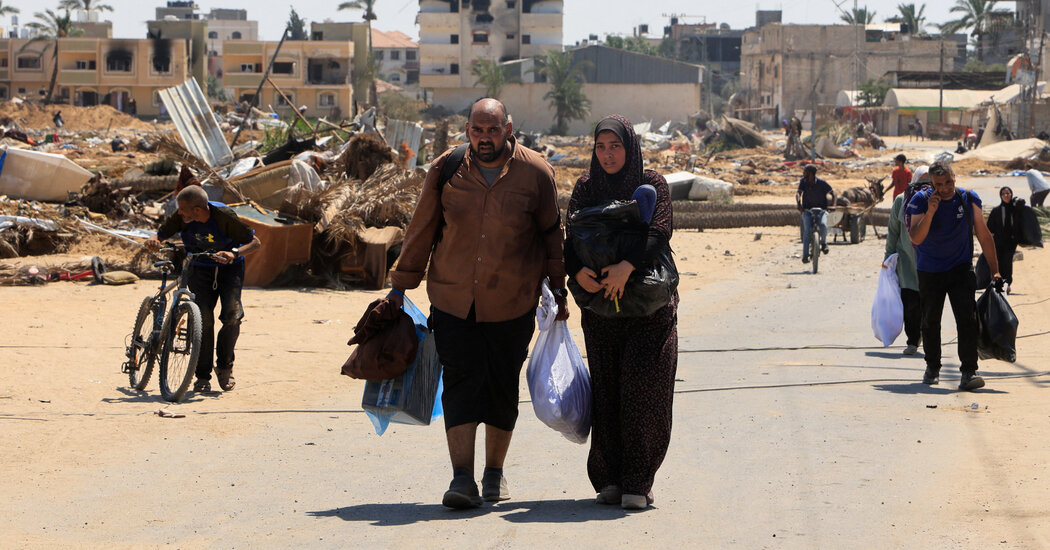The World Health Organization has accused Israel of attacking its site in central Gaza after the Israeli military expanded its operations in a part of the territory that had been left relatively unscathed during the war with Hamas.
Israel has leveled much of Gaza during the 21-month war. But Israeli forces had not previously launched a major assault on the city of Deir al-Balah, fearing that Hamas was holding Israeli and foreign hostages there.
In recent days that seemed to be changing after the Israeli military ordered residents in parts of the city to leave. Some Palestinians hoped the warning over the weekend was a tactic to force Hamas to make concessions in cease-fire talks, but Israel has stepped up attacks in the area.
A W.H.O. staff residence was damaged by airstrikes on Deir al-Balah on Monday, the agency said in a statement. An Israeli military official, who spoke on condition of anonymity to comply with protocol, said the strike took place after the staff was evacuated.
Israeli forces also entered the building, handcuffed and stripped male staff and family members sheltering there, and held them at gunpoint, the statement added. Women and children were forcibly evacuated, the agency said.
Another W.H.O. building, a major warehouse, was damaged in a separate attack and later looted by “desperate crowds,” the U.N. agency said.
The Israeli military said that its forces had come under fire while operating in the vicinity, leading them to respond “toward the area from which the shooting originated.” It did not deny raiding the W.H.O. facility but said any “suspects” had been treated “in accordance with international law.”
The Israeli military has launched strikes and ground operations around Deir al-Balah but has not advanced into the densely populated city center, where some residents were already fleeing north.
Yasser Rihan, 37, who left one of the evacuation zones on the southern outskirts of the city, said his family had huddled at home on Sunday night as airstrikes pummeled the area and gunfire echoed all around.
By Monday morning, other residents were frantic to get out, waving white flags in the hopes that they would not be shot, he said.
“The whole scene was unspeakable: children crying, women screaming in fear, everyone shouting and confused, asking, ‘Where should we go?’” Mr. Rihan said.
Deir al-Balah had been an informal refuge for Palestinians escaping other parts of Gaza, and huge tent camps have sprung up in the city. In the relative calm, a modicum of normalcy had survived. The city also hosts major warehouses for the United Nations, as well as guesthouses for the organization’s staff.
Many Palestinians fled to the north of the city after Israel issued its evacuation order, seeking safety in areas that the Israeli authorities had not declared potential combat zones. According to the United Nations, tens of thousands of people were sheltering in the zone covered by the evacuation order.
But there are few places left to flee to in Gaza. More than 85 percent of the enclave is under direct Israeli military control or subject to Israeli evacuation orders, according to the United Nations. The rest of Gaza’s nearly two million residents have been mostly hemmed into the shrinking parts that remain.
More than 57,000 people, including thousands of children, have been killed in the Israeli campaign against Hamas in Gaza, according to the Gaza health ministry, which does not distinguish between civilians and combatants.
A wider offensive in Deir al-Balah is unlikely to generate many major achievements for Israel, even if its forces manage to kill additional Hamas fighters in the area, said Shlomo Brom, an Israeli retired brigadier general.
Nearly two years into the war, which began with the Hamas-led attack on Israel on Oct. 7, 2023, Israel has said it will continue its military campaign until Hamas is destroyed. But the government of Prime Minister Benjamin Netanyahu has yet to articulate a clear vision publicly for who could take Hamas’s place in leading Gaza.
Some members of Mr. Netanyahu’s coalition government want to control Gaza indefinitely and establish Jewish settlements there, but Mr. Netanyahu has rebuffed those demands for now.
Without a clear path toward an alternative postwar order in Gaza, Israel’s military is simply “treading water,” General Brom said.
“A ground offensive and aerial strikes, no matter how intense, won’t change affairs except to increase the killing and suffering of the local population, even as we continue to lose more soldiers,” he added.
For the families of Israeli hostages, the potential of expanded attacks in Deir al-Balah has fueled fears for the lives of their loved ones. About 50 of the 250 captives seized during the Hamas-led attacks in October 2023 remain in Gaza, though dozens of those are presumed by the Israeli authorities to be dead.
The Hostage and Missing Families Forum, an advocacy group, has demanded that the Israeli government explain how an attack in central Gaza would avoid putting captives’ lives at risk.
“The people of Israel will not forgive anyone who knowingly endangered the hostages,” the forum said in a statement on Monday.
Aaron Boxerman is a Times reporter covering Israel and Gaza. He is based in Jerusalem.
The post Israeli Strikes Hit W.H.O. Site After Military Expands Gaza Offensive appeared first on New York Times.




